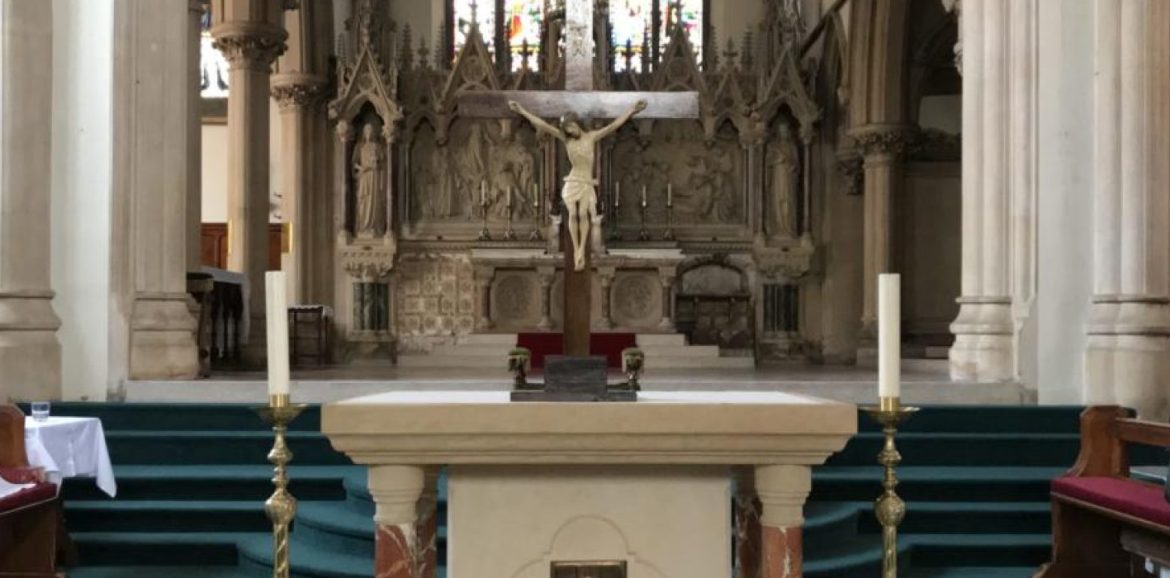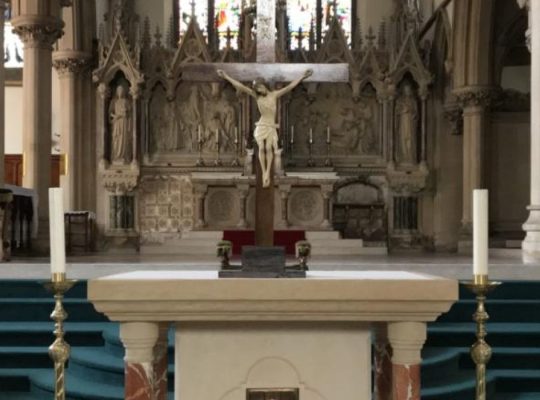Mark stays with Jesus on his first day at Capernaum. Everything began on the sabbath day in the synagogue with a session of teaching and then by an exorcism (last week) — events that revealed Jesus’ extraordinary authority. ‘What is this?’ Christians know the answer when they open the Gospels or hear the proclamation in the liturgical assembly they have joined. As soon as they hear ‘The Gospel of the Lord,’ they answer ‘Glory to you O Lord.’ We have here a profession of faith: the Lord Jesus is the Gospel, the Good News, God’s Word. For his part, Mark knows full well that he is addressing brothers and sisters in the faith, as we can see in particular in the ending of his Gospel. Because he addresses believers, he leaves the readers in front of the cross on which Christ has just died. In the way he structures his narrative and by his lively style, Mark, in every scene, goads his readers to test, make explicit, and renew their faith. He does this as early as his presentation or the first day of Jesus’ ministry, which this Sunday’s Gospel continues to record. ‘On leaving the synagogue he entered the house of Simon and Andrew with James and John. Simon’s mother-in-law lay sick with a fever. They immediately told him about her. He approached, grasped her hand, and helped her up. Then the fever left her and she waited on them.’ The simplicity and shortness of this account, devoid of any frills, again accentuates Jesus’ authority. However, if we pay attention, we understand that this is not just an intervention, normal after all, on Jesus’ part. Since he has the necessary power, why would he not use it for the benefit of this woman who is receiving him in her house and must be embarrassed not to be able, because of her sickness, to render him the duties of hospitality?
At this point in his narrative, Mark has recorded only one cure, that of the demoniac at the synagogue. Jesus has just left in the company of his four disciples. Of course, we could explain the juxtaposition of this two cures by recalling the ancient conception of disease as always in some way linked to the action of an evil spirit. But it is also said that Jesus ‘helped her up.’ The expression is not ordinary’ Mark employs a verb—egeirein—which usually means ‘to raise.’ The same word is found in a text from the Letter to the Ephesians, which most interpreters believe to be a fragment of a paschal and baptismal hymn. ‘Awake, O sleeper, and arise from the dead, and Christ will give you light.’ Finally, we read that Simon’s mother-in-law, freed from her fever, immediately resumed her duties as hostess and ‘waited on them.’ This last observation underscores the instantaneous and complete character of the cure. But does Mark want to suggest something more? Once standing, the baptised are constituted the servants of their brothers and sisters in the ecclesial community, after the example of Jesus, who came not ‘to be served, but to serve.’ We remember that after the multiplication of the loaves and the fishes, Jesus tells the disciples to serve this unexpected food to the people, who all eat to their heart’s content.
Wishing to round out the presentation of Jesus’ ministry, which this first day exemplifies, Mark shows him in the midst of the crowd. At sunset, the sabbath day ends. People are free to come and go, to resume their activities interrupted by the sabbath rest. ‘They brought to him all who were ill or possessed by demons. The whole town was gathered at the door.’ All are cured. By this generalisation, Mark shows us that nothing resists Jesus’ power and authority. He has been ‘sent by the Father to heal and save human beings.’ He came for the sick and the sinners.
Mark concludes the narrative of this first day by saying that Jesus did not permit the demons ‘to speak because they knew him.’ The devil, therefore, has been the first to know and broadcast the truth about the identity of Jesus, Son of God, who silenced this compromising testimony. We must confess that Mark’s exact intention escapes us. We could suggest that Mark wants to show how grave is the incomprehension of human beings: whereas Jesus multiplies benefits towards them, they do not recognise the Son of God in him, while the unclean spirits whom he strips of their power know right away who he is. In fact, this contrast gives us food for thought even today, For us Christians, who really is Jesus Christ? Is our profession of faith a formula learned merely by rote, or is it truly the expression of a deep conviction that changes our very lives because one day we met the Lord?
Every participation in the liturgical celebration inexorably poses these questions, not to arouse in us feelings of guilt but to encourage us to humbly and confidently progress in the way of faith. This faith is weak and sometimes wavering. However, we dare to say, ‘Jesus, the Son of God, is the Good News,’ asking him to take our hand, to wake us up from this lethargy that unceasingly threatens us and often immobilises us. ‘The Lord has come as the physician of those who are sick. He himself declares: ‘those who are well do not need the physician, but the sick do. I do not come to call the righteous but sinners.’ How will the sick get well? How will the sinners repent? Is it by continuing in the same state? Is it not, on the contrary, by a great change that causes them to leave their diseased and sinful condition.’
‘Rising very early before dawn, he left and went off to a deserted place where he prayed.’ For Mark, the general overview of Jesus’ activity would be incomplete without the mention of Jesus’ prayer. The time devoted to prayer is not taken at the expense of the care of the sick or the demands of teaching— ‘very early before dawn.’ Habitual intimacy with God—total and without break in Jesus’ case—does not do away with those pauses in silence and solitude, those face to face encounters, without distraction from the divine presence. Mark gives no information on Jesus’ prayer. No one can fathom its secret, because the relationship between Father and Son has no equivalent that could be used as a reference. But we do know that the whole of Jesus’ life was an offering to the Father, who will be perfectly accomplished in all things. His prayers must have been the expression of this offering and the renewal of his obedience. If prayer was a necessity for Jesus, it is all the more so for us.’If we do not know how to reserve a place for recollection and silence in our life, we cannot reach a higher degree and become able to pray in public places. Prayer makes us realise that one part of our being is immersed in our immediate circumstances, which is constantly worried and scattered, whereas another part of ourselves observes it with astonishment and compassion. The agitated person causes the angels to shake with laughter.’ (P. Evdokimov)
Simon and his companions go looking for Jesus, who has left there house. They find him and urge him to go back to the crowd waiting for him. Jesus replies: ‘ Let us go on to the nearby villages that I may preach there also. For this purpose I have come.’ Is there a causal relation between Jesus’ prayer and this decision? One thing is certain, Jesus has received from the Father the mission of announcing the Gospel ever further, without stopping on the way. One is reminded of the Sower in the parable who also ‘went out’ in order to cast seed by the handful, saving neither strength nor seed. One part of it will not fall on good soil. But in the good soil, the seed will yield thirty, sixty, and even a hundred-fold and will console the sower for what did not germinate for lack of favourable conditions. Then Jesus leads his disciples throughout the whole of Galilee. After the resurrection, Galilee will be the place where he instructs his disciples to meet him. He will tell them: ‘ Go into the whole world and proclaim the Gospel to every creature.’ ‘They went forth and preached everywhere.’
The Church must likewise be missionary in order to always carry the Gospel everywhere. An ecclesial community closed in upon themselves forgets the Lord’s example and demonstrates a lack of trust in the Spirit. It will soon become hardened. Every great period in the history of the Church has, in fact, been characterised by a powerful missionary thrust. It is told of Pope Pius XI (1922-1939) that he answered a bishop who was asking for guidance ‘Go farther.’ Mark no doubt remembers Paul and his great missionary journeys. In any event, the reading of his Gospel throughout the Sundays of this year’s Ordinary Time ought to awaken, stimulate, encourage the zeal and missionary boldness of Christian communities.
The life of each one of us, of all communities, of the Church, is crossed by trials that could produce moroseness, even pessimism. But instead of letting ourselves fall prey to these, we must in a trustful prayer turn to the Father. ‘Rightly is my hope strong in him, who sits at thy right hand and intercedes for us; otherwise I should despair. For many and great are my infirmities, many and great; but thy medicine is of more power.’ (Saint Augustine) The Lord raises us by the hand and makes us stand again. He calls us to his service and drives us to follow him, to be the servants of all, and to announce the Gospel, as far as we can go.
‘Praise the Lord who heals the broken hearted.’


